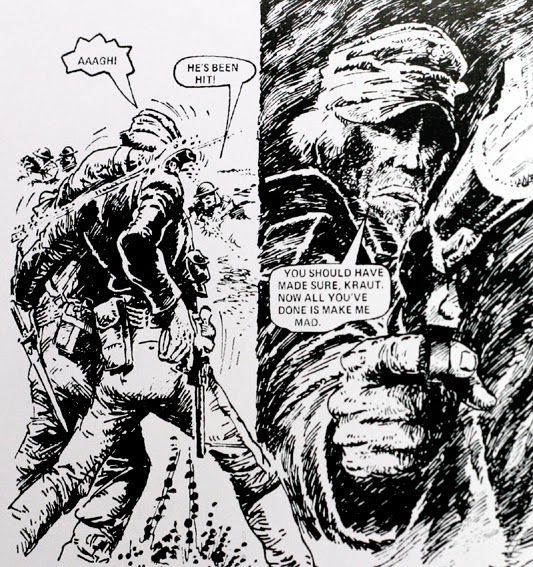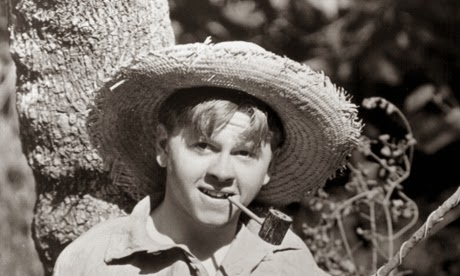In the late 1960's 'John Wayne for President' bumper stickers starting appearing on cars across America. This of course never happened,
( Ronnie Raygun was the screen cowboy who made his home in the White House) and one can only wonder what President John Wayne's America would have looked like. Of course the thought will horrify left wingers who take great delight in knocking Wayne's politics but fuck them, for no matter what Wayne thought politically there is no taking away the fact that he remains a bonifide screen legend, arguably the biggest screen legend of them all. When Wayne was told he had the Big C (interestingly this was a term that Wayne himself coined) he was quoted as saying, 'I sat there trying to be John Wayne.'
I know what he meant by that statement, for John Wayne was tough and virtually immortal and cancer or the Big C was no match for the man who had won the West. John Wayne, the man behind the screen persona may be long dead, but John Wayne, the screen icon, lives on and the Big C can just go and take a running jump.
Simon and Schuster have just published an interesting book about Wayne - John Wayne: The Life and Legend by Scott Eyman promises to shed new light on the legend. I've not read the book yet but there was a great article in the Times yesterday that looked at the book. From the article I learned that Wayne, at a stage when his screen persona was stamped in the mind of the world, was asked by Mel Brooks to star in his spoof western, Blazing Saddles.
'Not on your life,' Wayne told Brooks but did promise to be first in line to see the movie.
Wayne never claimed to be anything but a journeyman actor, merely playing himself over and over but even that assessment is flawed and Wayne displayed real acting chops in several movies - The Searchers, Red River and The Shootist to name but three. And in his book Eyman argues that Wayne's lasting achievement was injecting an authenticity into an art form which is, in essence, totally phony.
Wayne cultivated a macho image that his detractors take great delight in shooting down by stating that Wayne was actually a draft dodger. Whilst it is true that Wayne avoided serving in the Second World War, the official reason given was a ear problem, the reason for this was intense lobbying from the studio bosses who didn't want to see their top star sent off to fight overseas.
By modern standards Wayne may have been a bigot, but his attitudes were of his times and he shouldn't be criticized for that. He once commented about gay actor Rock Hudson - 'What a waste of a face on a queer. You know what I could have done with that face.'
Wayne was a hard living man - he would order six eggs for breakfast, he smoked six packs of cigarettes a day, even after beating his first bout of cancer, and drank tequila by the bottle. He was a man's man and there are precious few of them in today's inane Hollywood. Wayne was of the old school and although his politics may often seem to have been to the right of the extreme right, he was certainly far more complex than most people believe.
Wayne for instance was extremely cultured - he played Chess to tournament level, was a lover of Tolkein's Middle Earth stories, knew most of Shakespeare's works inside out and could quote Milton off the cuff.
As Wayne once told an interviewer, 'I could say isn't as well as ain't.'
Wayne's most complex role, that of the racist, misanthropic and violent Ethan Edwards in The Searchers, arguably the greatest western ever made and one of the greatest movies in any genre, took the Wayne image apart and anyone who says, 'Wayne always played himself,' should be made to watch this movie and then punched in the jaw for uttering such an inane cliche.
John Wayne you were loved and continue to be loved by a great many of us - God bless you, sir.
John Wayne the Life and Legend by Scott Eyman is available now
Simon and Schuster print and eBook
 A brutal murder in a
small Welsh village and the police are stuck without a clue. With no
motive and no real suspect the investigation soon grinds to a halt.
Enter Mary Alice Smith, otherwise known as Granny Smith, the rock music
loving, pipe smoking, chaos causing amateur sleuth with a difference.
A brutal murder in a
small Welsh village and the police are stuck without a clue. With no
motive and no real suspect the investigation soon grinds to a halt.
Enter Mary Alice Smith, otherwise known as Granny Smith, the rock music
loving, pipe smoking, chaos causing amateur sleuth with a difference.


































